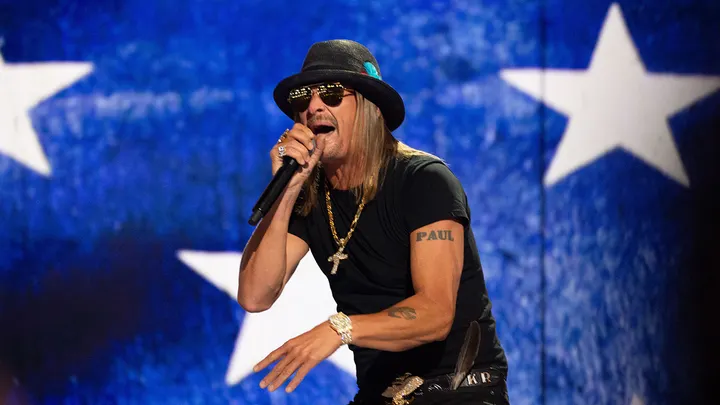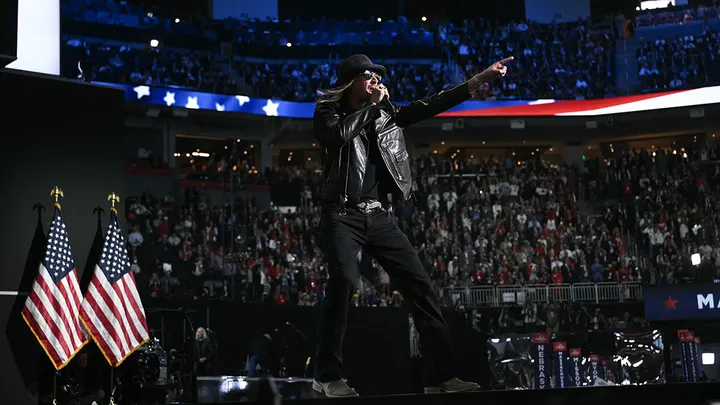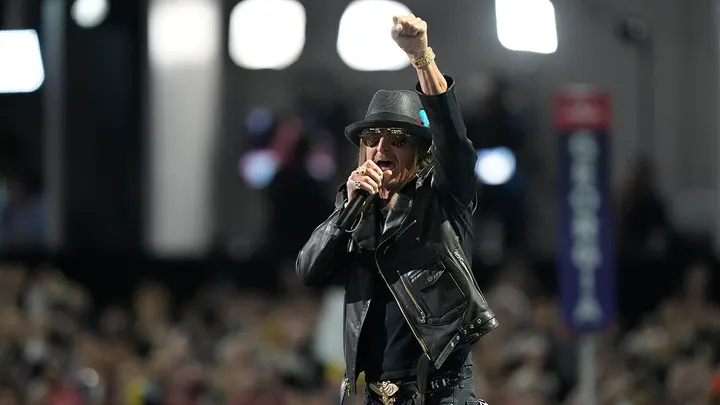Kid Rock has been a prominent figure in the music scene for decades, rising to fame with his 1998 album “Devil Without a Cause.” Known for his memorable stage persona, Kid Rock has become increasingly vocal about his political views over the years, particularly his support for former President Trump in all of his presidential runs.
Trump Targets Battleground State Nevada with “No Tax on Tips” Proposal
This week, Kid Rock performed on the final night of the Republican National Convention, just ahead of Trump’s speech. For the convention, he reworked his 2000 hit “American Bad A–” to include references to Trump. He began his performance by asking the audience to stand and raise a fist, leading them in chants of “Fight, fight!” and “Trump, Trump!”
One notable lyric change occurred toward the end of the song. Instead of singing the original line, “Smell the aroma, check my hits / I know it stinks in here ‘cause I’m the s—,” he sang, “I know it stinks in here ‘cause Trump’s the s—,” censoring himself on the last word. In the chorus, which typically features a chant of “Hey, hey!” Kid Rock encouraged the audience to shout Trump’s name and “fight.”
He concluded his performance by introducing UFC CEO and President Dana White, who spoke immediately before Trump gave his speech. “Ladies and gentlemen, get ready for the most patriotic American bada– on earth, President Donald J. Trump,” Kid Rock declared.

During his speech, Trump spoke warmly about Kid Rock, saying, “He became a friend of mine over the last ten years, and he’s amazing. Everyone loves him. I didn’t even know how big he was.” Trump noted that Kid Rock regularly draws crowds of 35,000 to 40,000 people and added, “I think he’s making so much money he doesn’t know what the hell to do with it.”
This week, Kid Rock put some of his money to good use by donating $50,000 to a fundraiser supporting those wounded in the July 13 shooting at a Trump rally in Butler, Pennsylvania. The fundraiser, authorized by Trump and created by his national finance director and senior adviser Meredith O’Rourke, has raised over $6 million, surpassing its original goal of $1 million.
Earlier this year, Kid Rock discussed his shift towards politics in an interview with Rolling Stone. “I’m not going to get it right every time,” he admitted, “but I know my heart’s right. I want the best for this country.” He acknowledged that supporting Trump could have ended his career but believed that many people shared his views. “That mother—— likes to win. He likes to cheat in his f—ing golf game. I want that guy on my team. I want the guy who goes, ‘I’m going to fight with you.’”

Kid Rock has been known for his polarizing views and actions. Last year, he made headlines by shooting up several Bud Light cans after Anheuser-Busch released a marketing promotion with transgender influencer Dylan Mulvaney. In a November episode of “Hannity,” he told host Sean Hannity that he is “uncancelable,” emphasizing his commitment to being true to himself regardless of financial consequences.
While Kid Rock achieved mainstream success in the late ’90s with songs like “Bawitdaba” and “Cowboy,” his musical career began much earlier. He first established himself in the Detroit hip-hop scene in the late ’80s as part of the Beast Crew. At 17, he signed his first record deal with Jive Records, but it didn’t last long. According to producer Mike E. Clark, Kid Rock was dropped by the label in 1990 after Vanilla Ice’s success tainted the market, a setback that Kid Rock found devastating.
Kid Rock’s journey from a music icon to a political firebrand has been marked by bold moves and unwavering opinions, reflecting his desire to impact both the music industry and the political landscape.

Kid Rock’s Journey: From Independent Struggles to Mainstream Success
Kid Rock’s rise to fame is a testament to his determination and hard work in the music industry. Music attorney Tommy Valentino recalled, “His attitude now was, ‘I’m not going to count on any record company to make me a star.'”
After being dropped by Jive Records, Kid Rock released his second and third albums through independent labels. During this time, he continued to develop his unique sound. Those who worked with him, including contemporaries like Uncle Kracker, noted his drive for fame. Drummer Bob Ebeling remembered, “He loved when we went somewhere to eat and somebody recognized him. He had this whole reward system in his head that didn’t exist in other people’s heads. When people recognize you and want a piece of you, it is the equivalent of being wealthy. He just ate it up.”
Al Sutton, co-founder and engineer of White Room Studios, recalled a pivotal moment: “We were at a restaurant in Royal Oak, a bunch of us hanging out, and he said, ‘Man, my next record … I’ve come up with this thing. I’m going to do a redneck, s—-kicking rock ‘n’ roll rap band.’ Everybody was laughing — ‘So that’s it, eh?'”

This unique blend of genres became Kid Rock’s signature style. In 1997, he was signed to Atlantic Records after executives saw him perform live. The following year, he released “Devil Without a Cause,” his breakthrough album that catapulted him to stardom.
Since then, Kid Rock has remained a household name. In September, he shared a Detroit Free Press article on X, formerly Twitter, reflecting on his journey. “I never taken the time to reflect how hard I worked, how blessed I am, and how so many great friends and people were so instrumental in my career,” he wrote. “Sitting on the lake this morning in Northern Michigan and re-reading it about brought a tear to my eye. A happy tear of reflection and gratefulness! Here’s to hard work and all of my hard-working friends, fans, and family!”
Kid Rock’s journey from struggling artist to mainstream success highlights his resilience and the impact of staying true to his vision. His story continues to inspire both fans and aspiring musicians.
